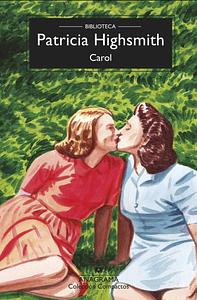You need to sign in or sign up before continuing.
Take a photo of a barcode or cover
emotional
hopeful
reflective
Plot or Character Driven:
A mix
Strong character development:
Yes
Yesssss cannot wait to watch this movie
I'm not sure what I expected after my ambivalence with regards to the movie but... this was worse, to be honest. Why:
- Uncomfy age gap where Carol literally refers to Therese as a child
- Weird persistent hatred of department store workers, including a woman who is only ever nice to Therese but is constantly belittled by both the character and the narrative
- Entirely too much time spent discussing money for a story that includes no plot points involving money
- Cheating (even in a crumbling marriage, still bad)
- Richard?? Deeply baffling character who was just incredibly annoying
- Somehow incredibly boring despite having the most melodramatic main character of all time
- Uncomfy age gap where Carol literally refers to Therese as a child
- Weird persistent hatred of department store workers, including a woman who is only ever nice to Therese but is constantly belittled by both the character and the narrative
- Entirely too much time spent discussing money for a story that includes no plot points involving money
- Cheating (even in a crumbling marriage, still bad)
- Richard?? Deeply baffling character who was just incredibly annoying
- Somehow incredibly boring despite having the most melodramatic main character of all time
reflective
slow-paced
Plot or Character Driven:
Character
Strong character development:
Complicated
Loveable characters:
No
Diverse cast of characters:
No
Flaws of characters a main focus:
Complicated
The Price of Salt is a rare mid-20th-century example of a lesbian relationship not entirely doomed, instead offering a hopeful ending. While somewhat outdated, much of the shame, expectations, and uncertainty experienced by Therese and Carol still resonate with modern readers.
The novel successfully presents the complexities and flaws of its main characters: Carol, a strong and autonomous woman dealing with divorce and maintaining custody of her daughter, and Therese, a young woman trying to find her place in the world.
Nevertheless, none of these characters were particularly likable. Carol's relationship with motherhood was complicated. While her actions can be viewed as an empowering rejection of the notion that women must prioritise motherhood, they can also be seen as neglectful, as she risks losing custody of her daughter over a relationship that lacks true substance. She was cold, and her narrative was often stunted.
Therese, for much of the novel, is very passive and relies on Carol for guidance. This dynamic emphasises the considerable age gap between them, with Therese being 19 and Carol in her early 30s. Though we get to see Therese's independence explored toward the end of the novel, it is brief.
I cannot help but view their relationship as teenage infatuation rather than a true romance. However, much of this lack of genuine connection can be attributed to the time period in which it was written.
I found the middle part of the novel, particularly the road trip, to be meandering but necessary for Therese's character growth. The writing was, at times, very poignant, and I enjoyed Highsmith's descriptions of seemingly unimportant details, which grounded the story.
Overall, the book was enjoyable enough and deserving of merit as an early classic in lesbian literature. Dare I say, though, that the movie was slightly better?
The novel successfully presents the complexities and flaws of its main characters: Carol, a strong and autonomous woman dealing with divorce and maintaining custody of her daughter, and Therese, a young woman trying to find her place in the world.
Nevertheless, none of these characters were particularly likable. Carol's relationship with motherhood was complicated. While her actions can be viewed as an empowering rejection of the notion that women must prioritise motherhood, they can also be seen as neglectful, as she risks losing custody of her daughter over a relationship that lacks true substance. She was cold, and her narrative was often stunted.
Therese, for much of the novel, is very passive and relies on Carol for guidance. This dynamic emphasises the considerable age gap between them, with Therese being 19 and Carol in her early 30s. Though we get to see Therese's independence explored toward the end of the novel, it is brief.
I cannot help but view their relationship as teenage infatuation rather than a true romance. However, much of this lack of genuine connection can be attributed to the time period in which it was written.
I found the middle part of the novel, particularly the road trip, to be meandering but necessary for Therese's character growth. The writing was, at times, very poignant, and I enjoyed Highsmith's descriptions of seemingly unimportant details, which grounded the story.
Overall, the book was enjoyable enough and deserving of merit as an early classic in lesbian literature. Dare I say, though, that the movie was slightly better?
Moderate: Stalking, Lesbophobia
Minor: Suicidal thoughts
emotional
medium-paced
Plot or Character Driven:
Character
Strong character development:
Yes
Loveable characters:
Yes
Diverse cast of characters:
No
Flaws of characters a main focus:
Yes
emotional
mysterious
sad
tense
medium-paced
Plot or Character Driven:
A mix
Strong character development:
Complicated
Loveable characters:
No
Diverse cast of characters:
No
Flaws of characters a main focus:
Complicated
reflective
slow-paced
Plot or Character Driven:
Character
Strong character development:
Yes
Loveable characters:
Complicated
Diverse cast of characters:
No
Flaws of characters a main focus:
Complicated
Graphic: Homophobia, Infidelity, Toxic relationship, Lesbophobia, Outing, Alcohol
Minor: Adult/minor relationship, Sexual violence
challenging
emotional
reflective
slow-paced
Plot or Character Driven:
Character
Strong character development:
Complicated
Loveable characters:
Complicated
Flaws of characters a main focus:
Complicated
emotional
hopeful
reflective
slow-paced
Plot or Character Driven:
Character
Strong character development:
Yes
Loveable characters:
Yes
Flaws of characters a main focus:
Yes







